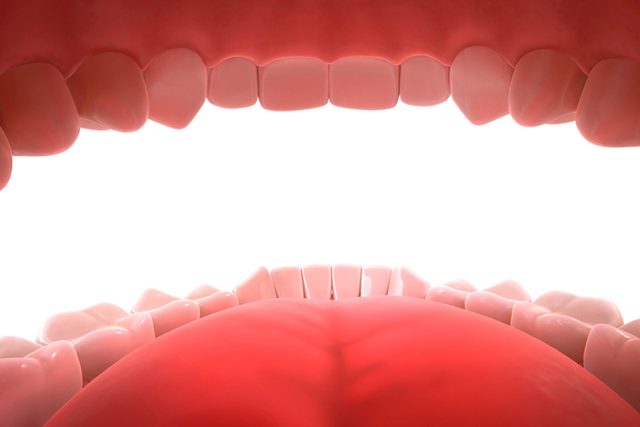Here’s Why Breathing Through Your Mouth Is Really Bad For You
Updated: Nov. 09, 2022
Breathing through your mouth, rather than your nose, can come with a host of unpleasant symptoms. Here's how it affects you—and what you can do about it.
What is mouth breathing?
Though mouth breathing happens for different reasons in adults and children, the culprit is usually a nasal obstruction. When we breathe normally through the nose, the air we take in is warmed and moistened before it gets to our lungs. If a person has difficulty breathing through the nose, however, he or she is forced to take in cold, dry air through the mouth.

What causes it?
Essentially an incorrect form of respiration, mouth breathing can happen for a number of reasons. “Some kids do it out of habit,” explains Dr. Veronique Benhamou, director of periodontology at McGill University in Montreal. “Their bite may be off, or the position of the jaw and teeth may be such that when they sleep, their lips don’t quite close.”A child may also suffer from abnormally large tonsils, which can obstruct breathing.
Dr. Harry Hoediono, president of the Ontario Dental Association, says mouth breathing may also occur as a result of a birth defect, like a deviated septum, that may make it more difficult to breathe through the nose. “It could even be a skeletal deformity that has never been picked up on, but that makes it easier for someone to breathe if they lean forward and breathe through their mouth,” he explains.
Dr. Hoediono also says that some people, especially older people, can end up mouth breathing as a result of taking medication, a condition called xerostomia. “In these cases, the dryness can be painful. It can feel like the mouth is burning,” he says. Mouth breathing can also develop after glands are damaged during chemotherapy and radiation treatments.
Why is it a problem?
One of the most common side effects of mouth breathing is an excessively dry mouth. Under normal conditions, saliva continuously washes bacteria from the mouth. If your mouth is dry, however, that bacteria can more readily take hold and cause problems like cause problems like cavities. “That’s because dry membranes are easier to invade,” explains Dr. Hoediono.
In children, mouth breathing can also lead to permanent skeletal deformities. That’s because it promotes the growth of the upper jaw, rather than the lower jaw. “The result is a large overbite and a gummy smile.”
Dr. Hoediono says that mouth breathing can also cause sleep difficulties, causing people to wake in the night if they aren’t getting enough oxygen. In children, lack of sleep may reduce their ability to pay attention and concentrate at school, which may be mistaken for attention deficit disorder. In adults, mouth breathing can be related to sleep apnea, which causes people to wake frequently at night. “You can end up feeling exhausted the next day,” says Dr. Hoediono. (Here are eight tips that can help you sleep better in a single day.)
Signs of mouth breathing
Dr. Benhamou says that while a natural mouth breather may be able to stave off dryness by remoistening the mouth throughout the day, it will get dry overnight. “Because you are breathing through your mouth all night, you dry out the soft tissues,” she explains. Mouth breathers often have chronically red and inflamed gums, even if their oral health is otherwise good. Adults may also find they have bleeding gums, or may get frequent cavities.
Dr. Hoediono says another sign is if the back of your throat feels dry and itchy when you wake up, or there’s a burning sensation. ‘When you wake up, put a finger over one nostril and try to breathe in while keeping your mouth closed, and then try it on the other side. Any difficulty inhaling could indicate a problem with blocked nasal passageways.’
Because it is so drying, mouth breathing can also cause chronic bad breath. “People tell me they brush their teeth constantly or they chew gum, but the bad breath is still there,” says Dr. Hoediono.
What to do if you’re a mouth breather
Dr. Benhamou says it’s important to determine why the mouth breathing is happening before you can correct it. “If the cause is huge tonsils, then removing them might be an option,” she says. If the problem is structural and a child can’t, for example, close his lips over flared front teeth, then the solution may be orthodontic treatment.
Using a humidifier while sleeping can help ease mouth dryness, as can replenishing with lots of fluids (here are some tips for choosing a humidifier). Dr. Benhamou sometimes suggests patients rub a small amount of vitamin E oil on their gums before bedtime to keep them from drying out overnight.
Dr. Hoediono says a thorough dental exam will help determine whether mouth breathing is a problem. It’s also important for parents to look for signs of mouth breathing in children, so the problem can be corrected before it worsens. “I had a mother bring a child in,” he recalls. “She had parched gums, a dry mouth, an overbite and an obstruction of the nasal passages,” a classic mouth breather. “I referred her to a doctor and they sent her for surgery. They removed a nasal obstruction, and not long after, she was feeling better and doing better at school!”